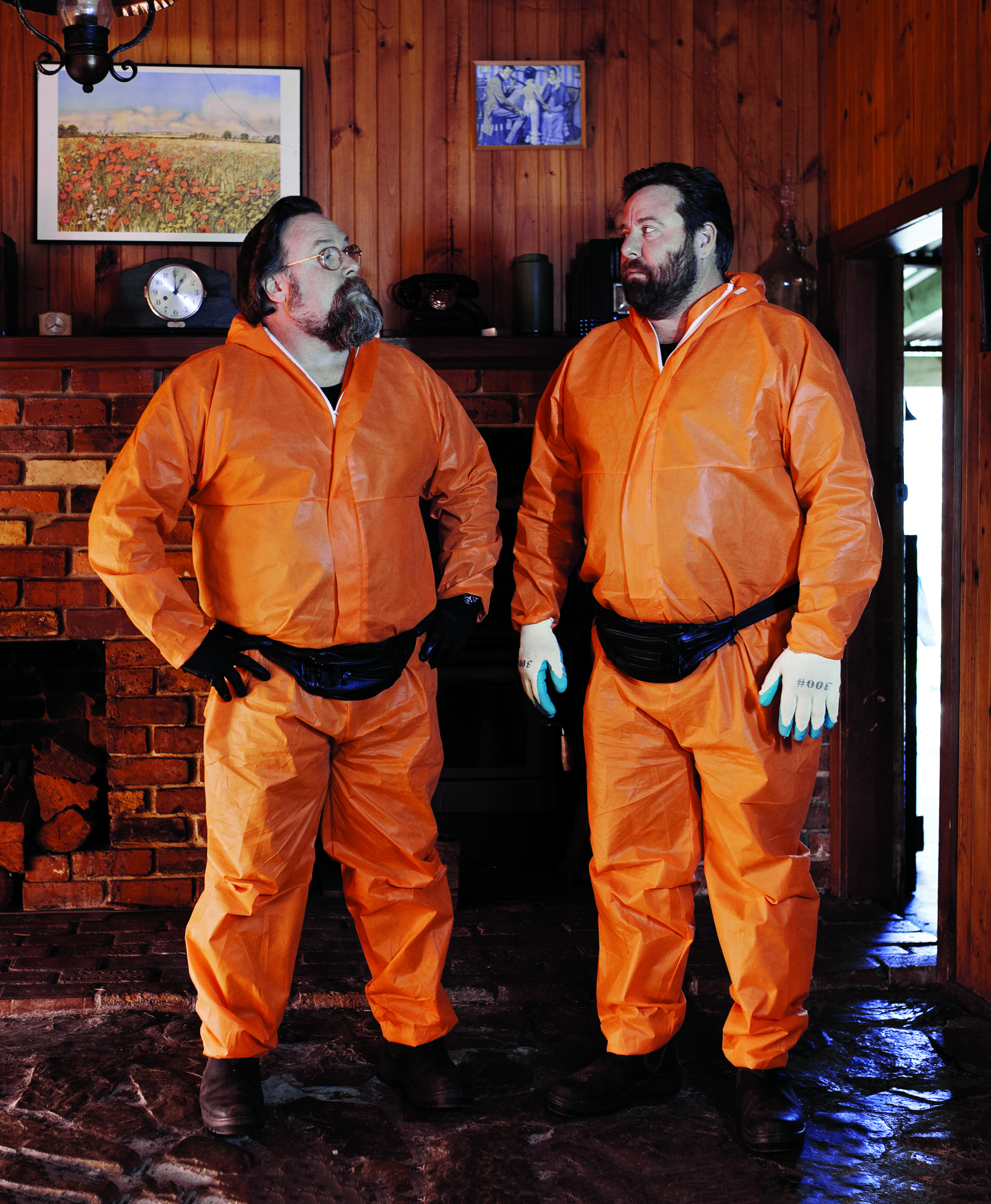We need to talk about Kenny (2006). At least, that seems to be the memo going out to critics reviewing Clayton Jacobson’s follow-up feature some twelve years later, Brothers’ Nest (2018). The Guardian’s review mentions Kenny four times, positing, ‘The Jacobsons have given us another comedy classic, far stranger than the last.’[1]Luke Buckmaster, ‘Brothers’ Nest Review – a Comedy-horror So Black That It’s Not Funny’, The Guardian, 21 June 2018, <https://www.theguardian.com/film/2018/jun/21/brothers-nest-review-a-comedy-horror-so-black-that-its-not-funny>, accessed 23 July 2018.
‘This ain’t Kenny,’ warns FilmInk. ‘Anyone expecting a redux of that amiable toilet-themed flick is in for the shock of their lives.’[2]Travis Johnson, ‘Brothers’ Nest’, FilmInk, 21 June 2018, <https://www.filmink.com.au/reviews/brothers-nest-sydney-film-festival/>, accessed 23 July 2018.
‘Brothers’ Nest is as far removed from the Jacobsons’ toilet-fixing mockumentary as you can get,’ according to Concrete Playground.[3]Sarah Ward, ‘Brothers’ Nest’, Concrete Playground, 21 June 2018, <https://concreteplayground.com/brisbane/event/brothers-nest/>, accessed 23 July 2018.
From Triple J: ‘radically different from what you’d expect’.[4]Amelia Navascues, ‘Movie Review: Brothers’ Nest’, ‘Screen Queen’, Triple J, 27 June 2018, <http://www.abc.net.au/triplej/screen-queen/brothers-nest/9913864>, accessed 23 July 2018.
Variety: ‘a very different kind of vehicle’.[5]Eddie Cockrell, ‘Film Review: Brothers’ Nest’, Variety, 18 June 2018, <https://variety.com/2018/film/reviews/brothers-nest-review-1202849373/>, accessed 24 July 2018.
The Sydney Morning Herald: ‘there’s none of [Kenny’s] genial view of the world’.[6]Paul Byrnes, ‘Brothers’ Nest Review: Jacobson Brothers Have Blood on Their Hands in Dark Comedy’, The Sydney Morning Herald, 19 June 2018, <https://www.smh.com.au/entertainment/movies/brothers-nest-review-jacobson-brothers-have-blood-on-their-hands-in-dark-comedy-20180619-h11kay.html>, accessed 23 July 2018.
You get the idea.
Now, I don’t mean to disparage these critics for going to the Kenny well (or outhouse, if you prefer). It’s an obvious point of reference, given that film’s prominence in Australian culture – and at the box office, where its A$7.6 million takings made it the second-highest-grossing Aussie film of its release year[7]Australian Film Commission, ‘2007 Box Office Backgrounder’, Screen Australia website, January 2008, p. 2, <http://afcarchive.screenaustralia.gov.au/downloads/pubs/2007bobackgrd.pdf>, accessed 23 July 2018. – and that this is the director’s first feature since. What’s instructive about the dominance of this narrative, I think, is how strongly critics position Brothers’ Nest as diametrically opposed to its predecessor. As the 2018 film is a black comedy about a pair of brothers planning to murder their stepfather, whereas Kenny was a good-natured comedy about a portaloo operator, that’s an understandable impulse. But I’d argue that the familial strife that sprouts in Brothers’ Nest was seeded in Jacobson’s first film.
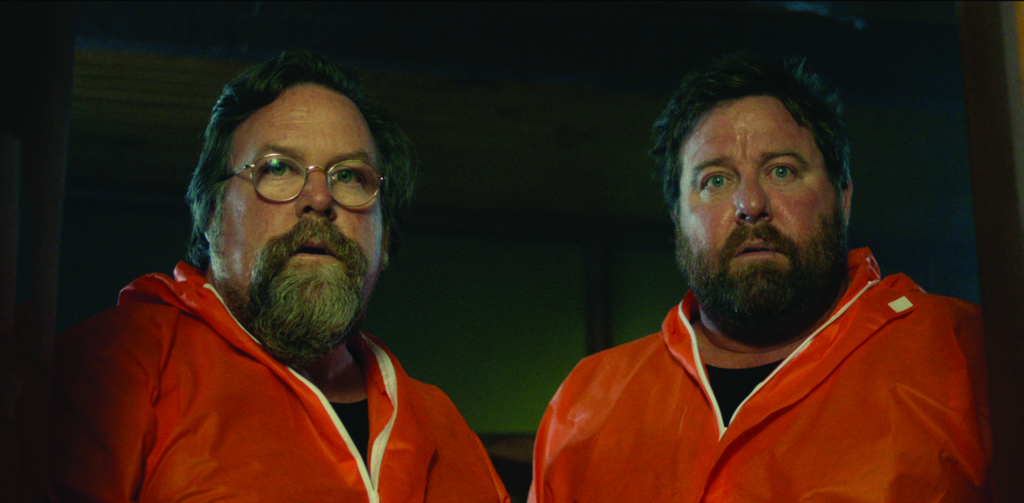
Kith and Kenny
You’ve probably seen Kenny. More than likely, you remember it fondly. You probably recall its eponymous lead (Shane Jacobson) as the perpetually positive dunny operator, as well as his endearing speech impediment. Maybe you recall his excursion to Nashville, or the climactic moment when the titular toiletier fills an arrogant arsehole’s luxury car with excrement.
If you haven’t seen Kenny for a while, however, you might have forgotten about the harder edge to the film. In particular, its representation of toxic Australian families jars with its reputation as an affable kind of contemporary Crocodile Dundee (Peter Faiman, 1986). Kenny has a polluted relationship with his ex-wife (Vicki Musso, only shown behind a blurred filter as befitting the mockumentary conceit), who regards him with barely a skerrick of respect. He’s held in similar disdain by his racist father and arrogant brother (played by Shane’s actual father and brother, Ronald and Clayton, respectively).
In such an ostensibly feel-good film, you’d expect such relationships to be mended by the time the credits roll, but Kenny concludes without any serious attempt to repair these tattered familial bonds. Tellingly, the only major attempt at reconciliation – a camping trip with Kenny’s father and brother, when he learns the former is terminally ill – is an abject failure, with Kenny’s brother ordering a cab to make an ignominious escape when the tension proves unbearable. While Kenny ends on an undeniably optimistic note, his relationship with his family (with the arguable exception of his son) is precarious at best, noxious at worst.
Despite their distinct worldviews, neither film has much truck for the warm-hearted cliché of family as an unbreakable bond. In many respects, Brothers’ Nest is simply a cynical extrapolation of the portrait of Australian family presented in Kenny.
Undeniably, Brothers’ Nest is tonally distinct from its predecessor, but the haste with which critics have identified the films as entirely different suggests how these elements of Kenny have been forgotten by the culture at large. I’d argue that’s something that Shane has consciously cultivated in an attempt to leverage his image as that classic Aussie archetype: the ‘Good Bloke’. The Good Bloke fronts up ads for IGA supermarkets and Isuzu trucks. The Good Bloke gets his mates together to tell a bunch of jokes, films it and sells the result (That’s Not My Dog!, Dean Murphy, 2018). The Good Bloke helms a film about a mischievous dog protecting penguins (Oddball, Stuart McDonald, 2015). The Good Bloke doesn’t have family problems. The Good Bloke certainly doesn’t scheme to kill his stepfather.
‘Just family shit’
Terry, Shane’s character from Brothers’ Nest, is not a Good Bloke. We’re introduced to Terry and his brother, Jeff (Clayton), while they are cycling through an eldritch Australian landscape in the wee hours. Dispassionate drone shots observe them trekking through farmland on their way to what turns out to be their family home. Before a word is spoken, it’s clear the pair are up to no good: their faces grim, their outfits dark, their intentions murderous.
Still, there’s a glimmer of Kenny in Terry; of the siblings, he’s unmistakably the more sympathetic of the two. Jeff has planned the day to a T. They arrive early. They carefully avoid leaving any traces of evidence. They clean the house. They rehearse the murder. Then, when Rodger (Kim Gyngell) arrives, they do the deed. The motivations for the murder remain murky; it’s intended to stop Rodger selling the house when their ailing mother (Lynette Curran) passes away, but Terry seems to be conflicted, and it’s increasingly clear that Jeff has ulterior motives.
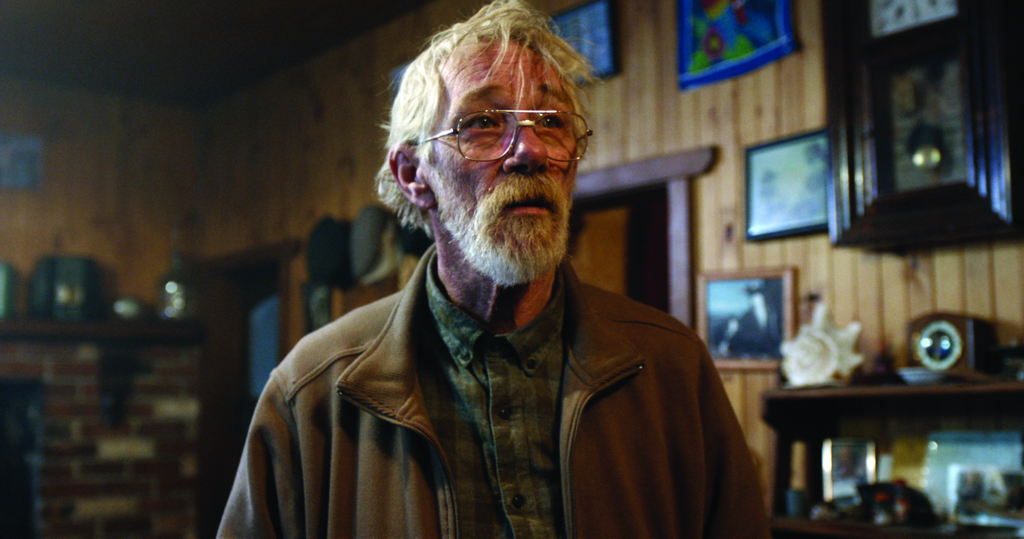
All of this transpires over the film’s glacially paced first act. The brothers bicker, and the outlines of their plan – and who they are as people – become clear. As authentic exposition, it’s effective: the conversations feel genuine, and we’re automatically engaged through our need to know what’s going on. Yet Brothers’ Nest, in its early stages, lacks a certain je ne sais quoi needed to elevate the material. We’ve seen enough genre films like this to know that one of the brothers will get cold feet, and we sure as hell know that things aren’t going to go to plan.
Too much of the first act reads as time-killing, particularly when Clayton – as director – indulges in formal flourishes like Terry having a vision of dead flesh behind bedroom wallpaper or a camera burrowing into one of Rodger’s many vintage radios. If I had to put my finger on what’s not so compelling about these scenes, it’d be the sense that Terry is too much of a pushover. He’s too easily manipulated by his older brother, who only needs to make a passing reference to their late father (who is strongly implied to have been abusive) to quell any of Terry’s objections. Any mounting tension is quashed by the realisation that the weak-willed younger sibling is at Jeff’s beck and call. Nor does it help that the film regularly cuts out of the house to exterior drone shots that undercut the cabin-fever vibe.
When we discover late in the piece – after blood has been shed, and secrets, revealed – that Jeff had been planning to frame his brother for Rodger’s murder all along, it doesn’t come as much of a surprise (though it certainly explains why, for example, their mugs were carefully labelled ‘Jeff’ and ‘Terry’, so that Jeff can avoid leaving his own DNA and fingerprints behind). I suspect that’s intentional on the part of both director Clayton and screenwriter Jaime Browne. This is a slow burn of a film: an active volcano building pressure until it eventually erupts. This metaphor might also explain why Brothers’ Nest’s first act is a tad underwhelming – active volcanoes are, after all, just mountains until they erupt – and why the film’s third act is its most compelling. Browne throws twist after twist at his audience, destabilising any sense of certainty: Terry decides to pull out of the planned murder just as Rodger arrives home – early, naturally – which eventuates in a chat turned heated showdown turned, finally, murder. Brothers’ Nest compounds the situation by revealing that the boys’ sick mother was actually in Rodger’s car, and the ensuing ultraviolence concludes with Terry the last man standing after an extended bloody showdown with his treacherous older brother.
This finale is over-the-top in the best of ways, catering to genre aficionados who may have grown bored during the drawn-out preamble. I’d even hazard a guess that Rodger’s demise – caused by a radio tossed into the bathroom – is a deliberate homage to Ozploitation classic Patrick (Richard Franklin, 1978). The film concludes with Terry selling the family horse to a dazed buyer, Sandy (Sarah Snook), as a fire rages behind him. There’s a sense of resignation to Terry, a tacit acceptance that he’s brought this on himself. When Snook’s character asks him what happened, he can only answer, ‘Just family shit.’
While Brothers’ Nest might be a far more downbeat film on the whole than the happy-go-lucky Kenny, each portrays Australian families with a great deal of pessimism. It’s interesting to observe Clayton’s character in each film. In Kenny, he regards family as an obstacle, bristling with barely restrained rage whenever he has to interact with his brother. In Brothers’ Nest, family is a lever: something he can deploy to, for example, dig himself out of financial trouble. Despite their distinct worldviews, neither film has much truck for the warm-hearted cliché of family as an unbreakable bond. In many respects, Brothers’ Nest is simply a cynical extrapolation of the portrait of Australian family presented in Kenny.
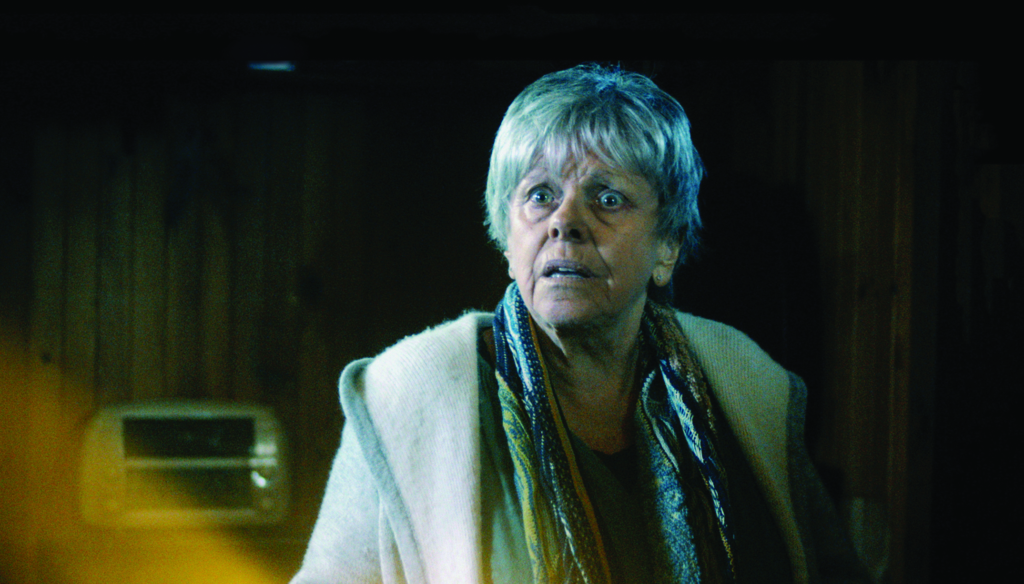
Selling unhappy families
While Kenny might have had a nasty streak running through it, it was undeniably an easier sell to audiences than Brothers’ Nest’s dark-hearted thriller. Complaints about Australian cinematic miserabilia may be overstated, but I’d still contend that the appetite for mean movies like this has waned since the days of The Boys (Rowan Woods, 1998) and Candy (Neil Armfield, 2006). Beyond obvious feel-good dramas, the highest-grossing Aussie films, more often than not, revolve around adorable animals – Babe (Chris Noonan, 1995), Red Dog (Kriv Stenders, 2011), Happy Feet (George Miller, 2006), the aforementioned Oddball – which perhaps explains why it took well over a decade for the Jacobsons to follow up the successful Kenny. Having had an earlier project stranded in development hell – ‘I literally had a film fall over that I’d been working on for 11 years,’ Clayton told ABC News in June[8]Clayton Jacobson, quoted in ‘New Australian Movie Brothers’ Nest Turns Film Financing on Its Head’, ABC News, 10 June 2018, <http://www.abc.net.au/news/2018-06-10/brothers-nest-movie-new-model-of-film-finance/9851724>, accessed 23 July 2018. – the brothers opted for an unconventional path to production. In ‘what is believed to be an Australian first’, they collaborated with smaller cinemas across Australia, scheduling special Q&A screenings in return for advance funding. The plan worked, in the sense that they were able to cobble together the necessary funds (somewhere under A$2 million) to make the film.[9]‘New Australian Movie Brothers’ Nest’, ibid. With Brothers’ Nest having earned around A$275,000 in Australia at the time of writing,[10]‘Australia Box Office for Brothers’ Nest (2018)’, The Numbers, <https://www.the-numbers.com/movie/Brothers-Nest-(Australia)/Australia#tab=box-office>, accessed 22 August 2018. it’s hard to judge if the model is profitable – but getting to actually make a film is half the battle nowadays.
While this specific funding approach is new for Australia, it’s not entirely unheard of. Steven Soderbergh used similar presale strategies to make Logan Lucky (2017),[11]Zack Sharf, ‘Steven Soderbergh Has a Game-changing Plan to Give Directors the Creative Control They Deserve’, IndieWire, 1 August 2017, <https://www.indiewire.com/2017/08/steven-soderbergh-logan-lucky-distribution-model-fingerprint-releasing-director-power-1201862463/>, accessed 23 July 2018. and the Brothers’ Nest creative team have their own experience with experimental releases: both That’s Not My Dog! (starring Shane) and The Mule (Tony Mahony & Angus Sampson, 2014; co-written by Browne) had roadshow-style limited-cinematic-release windows that prioritised home entertainment.
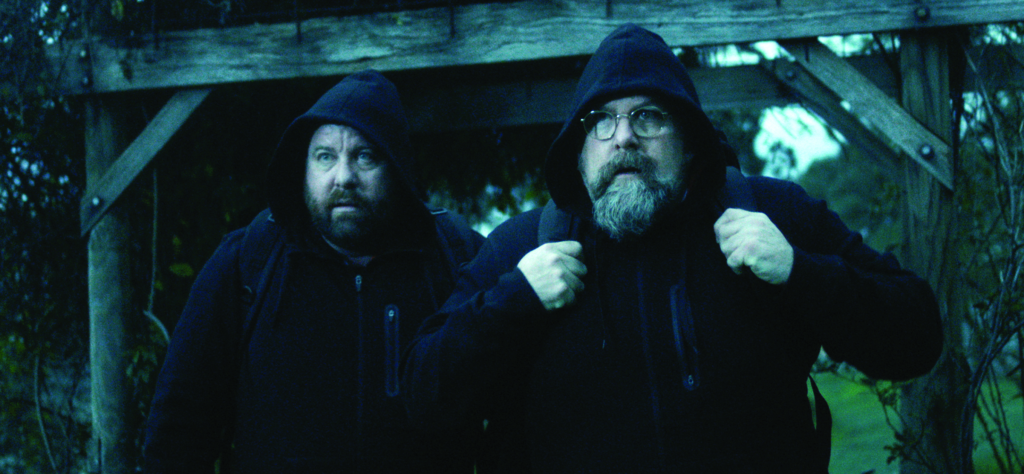
It’s unclear if this is going to be the path forward for Australian indie filmmakers, but, even though the comparison between Kenny and Brothers’ Nest is a tenuous one – Nest is undeniably a tougher sell – it’s hard not to feel a tinge of concern when the makers of one of Australia’s biggest indie hits of the twenty-first century have to resort to beseeching cinema owners for funding.
Endnotes
| 1 | Luke Buckmaster, ‘Brothers’ Nest Review – a Comedy-horror So Black That It’s Not Funny’, The Guardian, 21 June 2018, <https://www.theguardian.com/film/2018/jun/21/brothers-nest-review-a-comedy-horror-so-black-that-its-not-funny>, accessed 23 July 2018. |
|---|---|
| 2 | Travis Johnson, ‘Brothers’ Nest’, FilmInk, 21 June 2018, <https://www.filmink.com.au/reviews/brothers-nest-sydney-film-festival/>, accessed 23 July 2018. |
| 3 | Sarah Ward, ‘Brothers’ Nest’, Concrete Playground, 21 June 2018, <https://concreteplayground.com/brisbane/event/brothers-nest/>, accessed 23 July 2018. |
| 4 | Amelia Navascues, ‘Movie Review: Brothers’ Nest’, ‘Screen Queen’, Triple J, 27 June 2018, <http://www.abc.net.au/triplej/screen-queen/brothers-nest/9913864>, accessed 23 July 2018. |
| 5 | Eddie Cockrell, ‘Film Review: Brothers’ Nest’, Variety, 18 June 2018, <https://variety.com/2018/film/reviews/brothers-nest-review-1202849373/>, accessed 24 July 2018. |
| 6 | Paul Byrnes, ‘Brothers’ Nest Review: Jacobson Brothers Have Blood on Their Hands in Dark Comedy’, The Sydney Morning Herald, 19 June 2018, <https://www.smh.com.au/entertainment/movies/brothers-nest-review-jacobson-brothers-have-blood-on-their-hands-in-dark-comedy-20180619-h11kay.html>, accessed 23 July 2018. |
| 7 | Australian Film Commission, ‘2007 Box Office Backgrounder’, Screen Australia website, January 2008, p. 2, <http://afcarchive.screenaustralia.gov.au/downloads/pubs/2007bobackgrd.pdf>, accessed 23 July 2018. |
| 8 | Clayton Jacobson, quoted in ‘New Australian Movie Brothers’ Nest Turns Film Financing on Its Head’, ABC News, 10 June 2018, <http://www.abc.net.au/news/2018-06-10/brothers-nest-movie-new-model-of-film-finance/9851724>, accessed 23 July 2018. |
| 9 | ‘New Australian Movie Brothers’ Nest’, ibid. |
| 10 | ‘Australia Box Office for Brothers’ Nest (2018)’, The Numbers, <https://www.the-numbers.com/movie/Brothers-Nest-(Australia)/Australia#tab=box-office>, accessed 22 August 2018. |
| 11 | Zack Sharf, ‘Steven Soderbergh Has a Game-changing Plan to Give Directors the Creative Control They Deserve’, IndieWire, 1 August 2017, <https://www.indiewire.com/2017/08/steven-soderbergh-logan-lucky-distribution-model-fingerprint-releasing-director-power-1201862463/>, accessed 23 July 2018. |
